|
As the school year ends, young Masao is left alone when his closest friend Yuji heads off for a summer break with his family. It's an option not available to Masao, who lives with his grandmother, his father having died and his mother departed when he was just an infant. On discovering a picture of his mother and a forwarding address, Masao elects to make the long journey to the distantly located city of Toyohashi to find her, but is stopped in his tracks when he is fleeced of his meagre funds by a group of school bullies. A friend of the family intervenes, and on learning of Masao's quest orders her layabout husband Kikujiro to take the boy to find his mother. It's a trip Kikujiro undertakes with extreme reluctance and little concern for the feelings and welfare of his young charge, but over the course of their colourful journey, this is set to change.
Kikujiro – actually Kikujirô no natsu, literally 'Kikujiro's Summer' – marked a deliberate change of pace for multi-talented director, writer, leading man, comedian, artist and TV star Kitano Takeshi. Apparently weary of reviews that focussed almost exclusively on the violent elements of his previous yakuza-themed work as a director, he chose to make a film that would confound expectations, one devoid of violence that could be enjoyed by the whole family. The critical response had a predictable edge in the collective gasp of surprise that Kitano could tell an entertaining story devoid of his what were deemed his signature explosions of violence. It's a reaction I found frustrating at the time and continue to be irked by – had these people not seen A Scene at the Sea, his exquisitely subtle and violence-free story of a deaf dustman whose life is transformed by the discovery of a broken surf board? Did the poetry of Sonatine fly completely over their heads? And what of the warmly autobiographical elements of Kids Return? Kitano had nothing to prove, but went ahead and proved it anyway. Kikujiro is a violence-free delight, but is also every inch a Kitano Takeshi film.
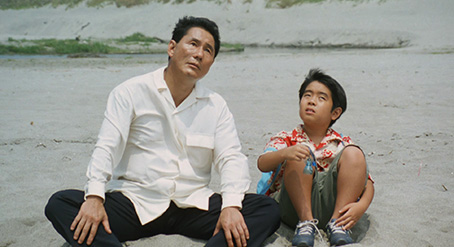
Kitano himself has admitted that the central premise of Kikujiro is far from original – two mismatched individuals hit the road and over the course of a series of misadventures gradually learn from and warm to each other – but he reinvigorates the formula in his distinctive approach to character, humour and cinematic storytelling. The pivotal role of Masao is a case in point. In the casting of newcomer Yusuke Sekiguchi, Kitano deliberately avoids cutesifying a role that would traditionally serve as a showcase for the next child star to be. Not instantly charismatic and given to silent and sometimes expressionless observation, Masao quickly becomes a figure of empathy and identification not because he acts like a wise-arse adult in a the guise of a child (thanks for that one, Hollywood), but because he comes across as an ordinary kid, one whose longing to meet his mother grows from a lonely yearning for those aspects of family life that his friend Yuji takes for granted. That he's the victim of schoolyard bullying is subtly suggested in the opening scene, when he and Yuji choose an alternative route home after catching sight of the older boys who later try to rob him, while his sense of isolation is brought subtly home by the meal left out by his grandmother for him to eat alone, and in his solitary attendance at a football practice session that is no longer running now that the school term has ended.
In casting himself in the key role of Kikujiro, Kitano initially paints him with unflattering colours, all the more intriguing when you learn that the character was based directly on his own father. First introduced as a put-upon sidekick to his overbearing wife (Kishimoto Kayoko, who also played Kitano's downcast and largely silent wife in Hana-Bi), he grumpily agrees to accompany Masao, then takes the money his wife gives him for the journey and heads straight to the race track with Masao in tow and gambles it away. A lucky guess on winners by Masao lands them enough cash for a night in a hotel, but the following day Kikujiro throws their remaining winnings away trying in vain to repeat and build on his earlier success, then blames everyone but himself, Masao included, for his failure to do so.
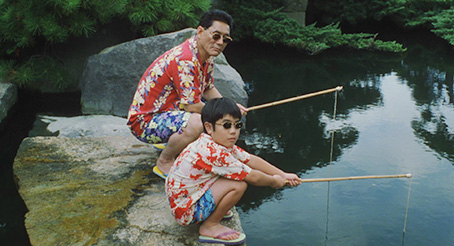
Their subsequent journey to Toyohashi unfolds as a series of small adventures – all chaptered as entries in Masao's photo diary – as Kikujiro's sometimes self-centred behaviour and ill thought through schemes move the story forward in colourful fits and starts and intermittently leave the pair stranded. This effectively structures the film as a collection of almost stand-alone vignettes, narratively linked sketches whose comical thrust is sometimes underscored by a touching element of sadness, each of which contribute to our understanding of the two lead characters and their fitfully evolving relationship. Occasionally, as with Kikujiro's repeated failure to score at the race track (where punters bet on colourfully dressed cyclists), Kitano comes close to labouring the joke, yet later when the pair become stuck at a bus stop and repeatedly fail to flag down passing cars, it's the length and extended timescale of the sequence that really bring home the impact Kikujiro's loutish arrogance is having on Masao. It's a pivotal moment for the characters and story, the scene in which both we and Masao begin to suspect the pair will never reach Toyohashi, but also the one in which Kikujiro discovers that the boy and he have something fundamental in common, a realisation that prompts him to be more protective of Masao and his feelings and take a more positive approach to their quest.
A considerable part of the joy of the film comes from the diverse range of characters the pair meet and intermittently hook up with on their journey. In the first half they tend to function primarily as foils for Kikujiro's comical aggression, but as the story progresses the supporting cast take on a more substantial role, and in the final third become key members of an engaging ensemble group. Each is entertainingly colourful in his or her own way, from the would-be Hell's Angels (played by Ide Rakkyo and the wonderfully named The Great Gidayû) who wouldn't say boo to a goose (when Kikujiro threatens to steal one of their bikes, its owner meekly responds, "That wouldn't be nice"), to the young couple who juggle and perform for Masao, and the upbeat travelling poet (Imamura Nezumi) who is just too easy-going to be intimidated by Kikujiro's verbal bullying. And yes, that's Kitano's old mansai comedy partner Beat Kiyoshi as the man at the bus stop "with that face."
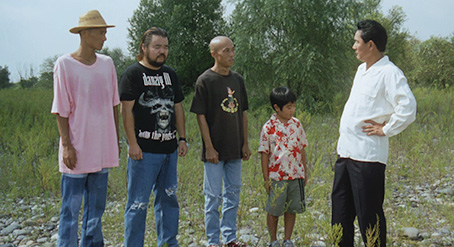
Although it has its share of amusing verbal exchanges, much of the humour derives from Kitano's singular gift for visual and often cinematic comedy. His signature before/after editing style delivers one of its funniest gags here, as Kikujiro's attempts to show off his poor swimming skills see a fifteen minutes of real world action compressed into four brief static shots whose juxtaposition is genuinely laugh-out-loud funny. Elsewhere, the comic punch line of a scene is both concealed and heightened by canny camera placement and editing decisions (those who know the film will doubtless remember the watermelon bashing game – I shall say no more), while Masao's attempt to kick a stationary football only to completely miss the ball and fall on his back is rendered all the more effective by the unexpected switch to an aerial wide shot for the tumble itself. Kitano also takes the odd risk in what he is prepared to play for laughs, notably when Masao is callously left outside a restaurant by a grumpy Kikujiro and almost falls victim to a predatory paedophile, a potentially distressing sequence whose blackly comic edge does not diminish the seriousness of the man's intentions and also serves to move the story and characters forward.
Kitano's playfully surrealist leanings are even more pronounced here than in his previous films, notably a highly stylised nightmare featuring Masao's mother and the paedophilic 'Scary Man', and a sequence in which two festival workers reappear dressed as dancing demons, their movements ghosted and peppered with lightning flashes. The surrealism even seeps into reality in the increasingly bizarre games Kikujiro, the poet and the bikers play to entertain Masao, which have them individually dressed as a fish, an octopus, an alien, and even stark naked, a cultural film taboo made strangely family friendly by one of the oddest (and creepiest) optical effects you'll see in a film all year. And nestled within the fun are two beautifully handled, lump-in-the-throat moments whose effectiveness is down almost solely to Kitano the director and serious actor. I can't go into detail without delivering a serious spoiler for newcomers, but both involve looks of realisation and sadness on the part of Kikujiro, both involve mothers, and both have had me wiping away a tear every single time I have watched the film.
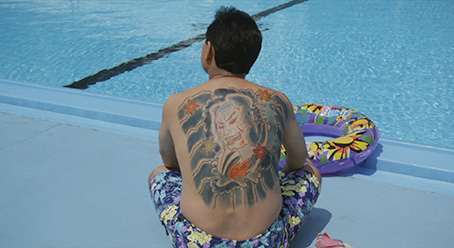
Just who Kikujiro is – or more accurately was – remains teasingly unclear. Although he likes to act tough, he is very much under the thumb of his domineering wife, who at one point verbally slaps him down for trying to play gangster when he threatens bullies who are attempting to rob Masao. Yet later when he is poolside with Masao, he takes off his shirt to reveal a back covered with the sort of elaborate tattoo worn almost exclusively by ranking yakuza. Is he an ex-yakuza who has fallen from grace and who expresses his frustration through verbal aggression? Or is he a wannabe tough guy who has taken his gangster dreams to the extreme of bodily decoration, something still regarded as a serious social no-no in Japan? Later, when confronted by a group of genuine yakuza hard men for making trouble at a festival in which they clearly have an interest, he delivers a very gangster sounding threat ("I'll crush you and your family!") but ultimately takes a beating and pleads for mercy on the basis that he has a child to take care of, a claim that fails to impress his aggressors one bit. He's certainly racked with insecurity, mocking a pair of tap-dancing waiters and a female juggler whose skills he subsequently works to copy and then dismisses as something that anyone could learn (Kitano himself is a seriously proficient juggler and tap dancer, it should be noted).
More than once, Kikujiro risks tipping headlong into sentimentality, but every time it comes close, Kitano quickly manages to get the film back on track, leaving us with the emotional effect but effectively stripping it of sugary excess. It's a film that prompts real emotional engagement because it cares for characters that it is happy to paint in imperfect colours, allowing us to warm to them over the course of the story rather pushing them on us in a cheap hard sell. Capping things off is a score by Kitano regular Joe Hisaishi that for me is one of his absolute best – the main theme alone, with its gorgeous blend of strings and piano, is one of my all-time favourite compositions for film. The combined effect is bewitching, its effect encapsulated by the opening slow motion shot of Masao running, which is actually from the end of the film – it may mean little the first time around, but on subsequent viewings carries so much meaning that the response is one of gleeful anticipation at the prospect of taking this wonderful journey again.
The 1.85:1 1080p transfer here is good but a couple of notches shy of perfect. Dust and damage free with generally well balanced contrast and a pleasing rendition of the film's sometimes pastel colour palette, the sharpness certainly improves on the US DVD from Columbia Tristar (I've not seen the 2005 region 2 DVD from Twentieth Century Fox) and the image feels richer and more pleasing overall, but there's still a very slight softness to the fine detail that prevents it from reaching Arrow restoration status. That said, this was the first time I noticed the small tear running down the face of Masao's mother in the nightmare sequence.
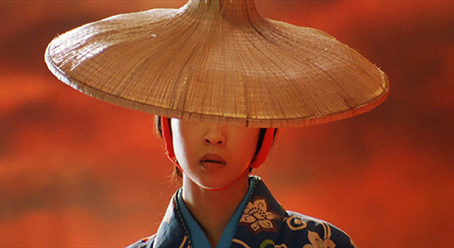
The Linear PCM 2.0 stereo soundtrack is in excellent shape, with impressive clarity, distinct stereo separation and a better than expected bass response, with Joe Hisaishi's score really shining here. The sound level is a tad lower than the Blu-ray average, so you may need to up the volume a little from your usual settings.
Optional English subtitles are or by default and are cleanly presented.
Jam Session: Official Bootleg of Kikujiro (92:57)
When I first head that Third Window were releasing Kikujiro on Blu-ray, the sole entry on my extra features wish list proved to be the very documentary they have chosen to include. Made by Shinozaki Makoto, the award-winning director of Okaeri and Not Forgotten, it's a feature-length, behind-the-scenes look at the making of Kikujiro, and a film I've been trying to track down for years. With Shinozaki at the helm, you might be expecting a slickly made and in-depth take on a familiar formula, but for the most part this is by the making-of documentary book, consisting solely of handheld DV footage of the preparation for and shooting of a large number of sequences, plus the hoped-for moments of on-set relaxation and fun. The key thing Shinozaki brings to the project is unrestricted access, ensuring that he and his crew are able to move freely on location and in the studio, and even accompany Kitano to an impromptu meeting with master Chinese filmmaker Hou Hsiao-Hsien (he of Café Lumière, Three Times and The Assassin). With no cast and crew interviews to break things up, for some the film's length will make itself felt (if so, feel free to watch it in three half-hour episodes), but like the epic behind-the-scenes video that accompanied the Tartan Vengeance Trilogy release of Park Chan-wook's Oldboy, after a while you almost feel part of the production. An invaluable look at Kitano the director and actor at work, it's frequently entertaining and often revealing (there's more on-set improvisation of ideas and shots than I was expecting), and Kitano's description of Kikujiro as "a conventional story...with a good dose of modern jazz" sums it up rather well. Man, does Kitano smoke a lot, though. That Third Window had to settle for a low-band copy of the film is clearly indicated up front and should not impact in any way on your enjoyment and appreciation.
A change of pace for this distinctive director but still very much a Kitano Takeshi film, Kikujiro is an imaginative and richly entertaining treat, and quite possibly Kitano's most easily accessible film to date for those not familiar with his impressive body of work as a director. Third Window's Blu-ray delivers a solid if not outstanding transfer and a fine soundtrack, and really scores with the inclusion of Shinozaki Makoto's Jam Session documentary. For the film and that fine extra feature (and, with small reservations, the transfer), warmly recommended.
|